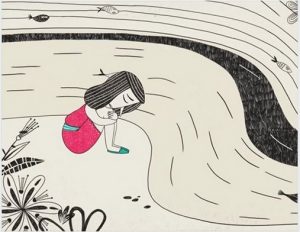centro cultural tina modotti Darcy Ribeiro (Brasile)
di Darcy Ribeiro (Brasile)
Mi schierai dalla parte dei popoli originari,
e mi sconfissero
Mi schierai dalla parte dei negri,
e mi sconfissero.
Mi schierai dalla parte dei poveri e mi sconfissero.
Mi schierai dalla parte dei lavoratori e mi sconfissero.
Ma mai sono stato dalla parte di chi mi ha sconfitto.
Questa, è la mia Vittoria.
_

de Darcy Ribeiro (Brasile)
Me puse del lado de los pueblos originarios,
y me derrotaron.
Me puse del lado de los negros,
y me derrotaron.
Me puse del lado de los pobres
y me derrotaron.
Me puse del lado de los trabajadores
y me derrotaron.
Pero nunca me puse del lado
de quienes me derrotaron.
Esa, es mi Victoria.
_
traduzione t.alessi
illustrazione Gabriela Badillo
Darcy Ribeiro (October 26, 1922 – February 17, 1997) was a Brazilian anthropologist, author and politician.
His ideas of Latin American identity have influenced several later scholars of Latin American studies.
As Minister of Education of Brazil he carried out profound reforms which led him to be invited to participate in university reforms in Chile, Peru, Venezuela, Mexico and Uruguay after leaving Brazil due to the 1964 coup d’état.
During the first mandate of governor Leonel Brizola in Rio de Janeiro (1983–1987), Darcy Ribeiro created, planned and directed the implementation of the Integrated Centres for Public Instruction (Centros Integrados de Ensino Público), a visionary and revolutionary pedagogical project of assistance for children, including recreational and cultural activities beyond formal instruction – making concrete the projects envisioned decades earlier by Anísio Teixeira.
Long before politicians incorporated the importance of education for the development of Brazil into their discourse, Darcy Ribeiro and Leonel Brizola had already developed these ideals.
Darcy Ribeiro’s ideas belonged to the evolutionist school of sociology and anthropology, and his main influences were Neoevolutionists Leslie White and Julian Steward, and the Marxist archeologist V. Gordon Childe. He believed that people went through a “civilizatory process” beginning as hunter-gatherers … keep on reading Wikipedia